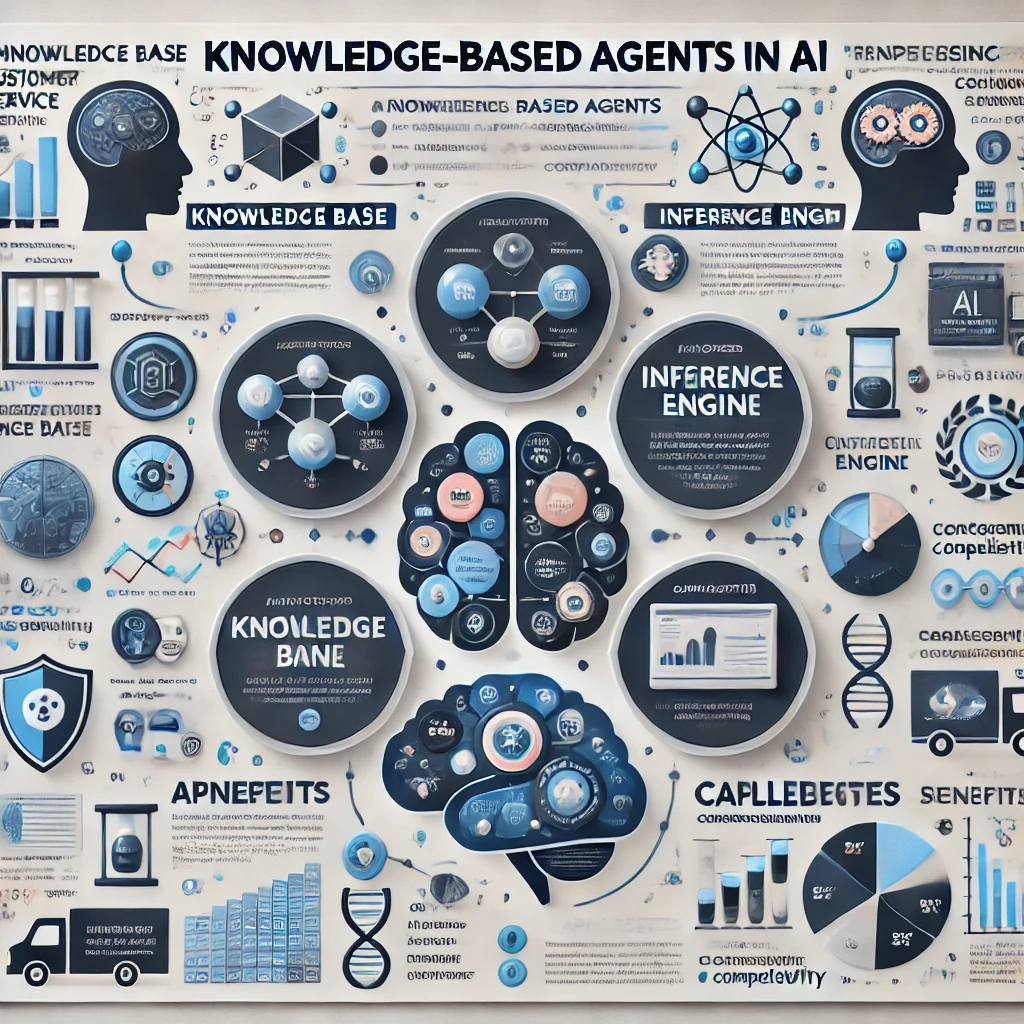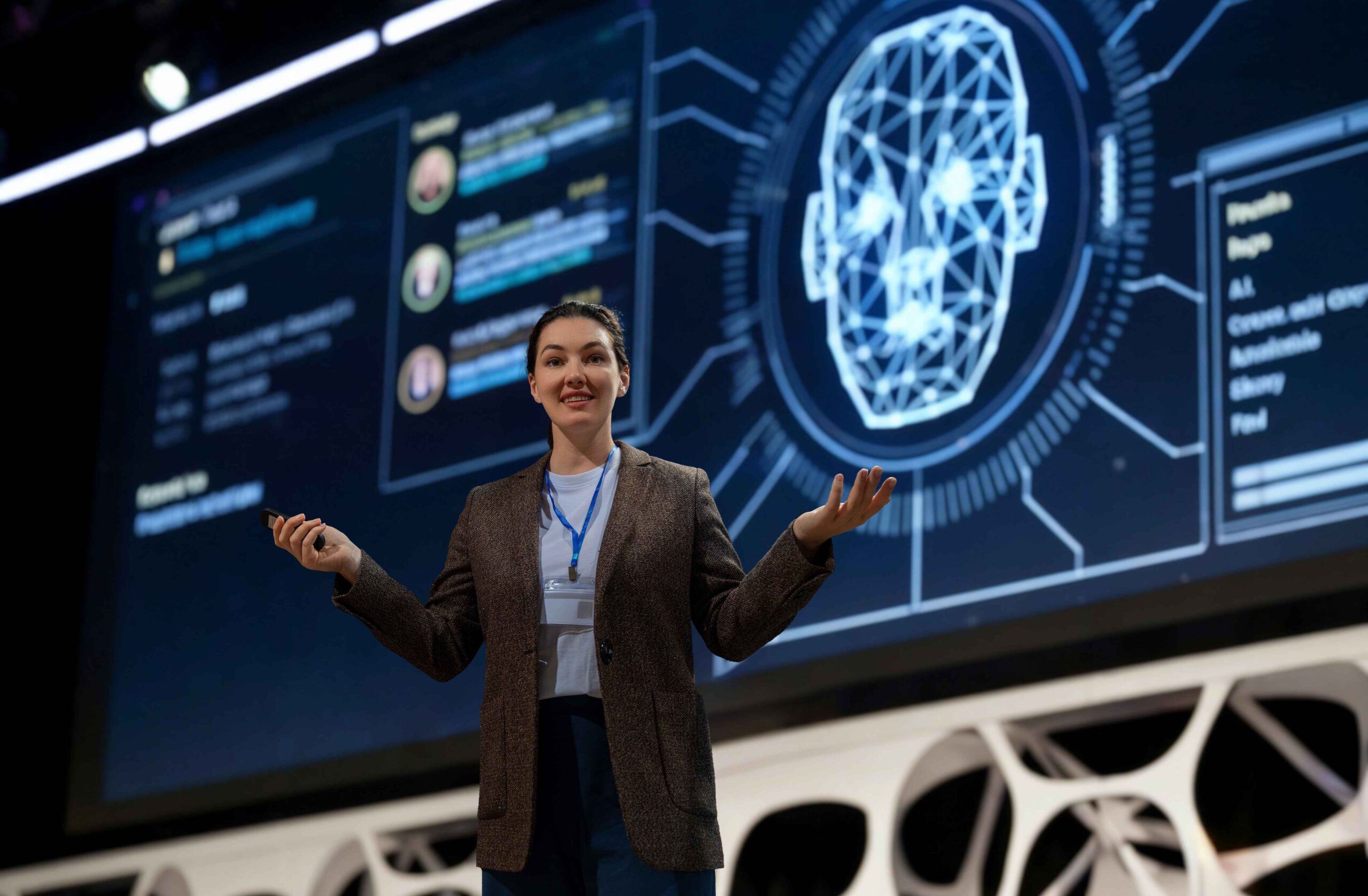Introduction to the topic
Importance of knowledge in AI
What is a Knowledge-Based Agent?
- Definition of a knowledge-based agent
- How it differs from other AI agents
Components of a Knowledge-Based Agent
- Knowledge base
- Inference engine
- Reasoning capabilities
How Knowledge-Based Agents Work
- Understanding the process
- Role of facts and rules
Types of Knowledge in AI
- Declarative knowledge
- Procedural knowledge
- Meta-knowledge
Applications of Knowledge-Based Agents
- Real-world use cases
- Industries leveraging this technology
Benefits of Knowledge-Based Agents
- Improved decision-making
- Enhanced problem-solving capabilities
Challenges of Implementing Knowledge-Based Agents
- Knowledge acquisition bottlenecks
- Computational complexity
Knowledge Representation Techniques
- Semantic networks
- Frames
- Logic-based representations
Knowledge-Based Agents vs. Other AI Models
- Comparing with machine learning models
- Pros and cons
Examples of Knowledge-Based Agents in Action
- Case studies
- Popular implementations
Future of Knowledge-Based Agents
- Emerging trends
- Potential developments in AI
Ethical Considerations in Knowledge-Based Agents
- Data privacy concerns
- Bias in knowledge representation
How to Build a Knowledge-Based Agent
- Key steps in development
- Tools and frameworks
Conclusion
- Summarizing the role of knowledge-based agents
- Their future in the AI landscape
FAQs
5 unique questions related to knowledge-based agents
Knowledge-Based Agent in AI
Artificial intelligence is transforming the world, but what makes some AI systems smarter than others? The answer often lies in their ability to reason and use knowledge effectively. Enter the knowledge-based agent—an AI model designed to process and use knowledge for better decision-making. Let’s explore what these agents are, how they work, and their significance in AI.
What is a Knowledge-Based Agent?
A knowledge-based agent is an AI system that relies on a structured knowledge base to make decisions. Unlike simpler AI models that rely solely on patterns, these agents use explicit facts and rules to reason and draw conclusions.
How It Differs from Other AI Agents
While machine learning models learn from data and make predictions, knowledge-based agents are pre-equipped with domain-specific knowledge, enabling them to reason logically rather than relying solely on data patterns.

Components of a Knowledge-Based Agent
1. Knowledge Base
The knowledge base is the heart of the agent. It stores facts, rules, and other relevant information about the world.
2. Inference Engine
The inference engine processes the knowledge in the database, applying logical rules to deduce new information or solve problems.
3. Reasoning Capabilities
These agents can reason through a combination of stored knowledge and logical processes, making them adept at solving complex problems.
How To MAKE MONEY With AI Agents In 2025 [ULTIMATE GUIDE]
How Knowledge-Based Agents Work
At their core, knowledge-based agents operate through two key steps:
- Perceive: They gather facts about their environment.
- Reason: Using their inference engine, they apply logical rules to derive conclusions and decide on actions.
The process involves manipulating facts and rules to determine the best course of action in a given situation.
Types of Knowledge in AI
Declarative Knowledge
This includes facts and information, such as “A triangle has three sides.”
Procedural Knowledge
This covers the “how-to” aspects, like the steps for solving a math problem.
Meta-Knowledge
This refers to knowledge about knowledge, such as determining the reliability of a source.
Applications of Knowledge-Based Agents
Knowledge-based agents have a wide range of applications, including:
- Healthcare: Assisting in medical diagnosis and treatment planning.
- Customer Service: Powering advanced chatbots capable of handling complex queries.
- Education: Designing intelligent tutoring systems.
- Legal Systems: Supporting legal research and contract analysis.
Benefits of Knowledge-Based Agents
- Improved Decision-Making: They can reason through multiple scenarios and offer logical conclusions.
- Enhanced Problem-Solving: Their structured approach helps in solving intricate problems.
- Transparency: The reasoning process is often easier to understand compared to black-box AI models.
Challenges of Implementing Knowledge-Based Agents
Knowledge Acquisition Bottlenecks
Gathering and structuring knowledge is time-consuming and requires domain expertise.
Computational Complexity
Reasoning with large datasets and complex rules can be computationally intensive.
Knowledge Representation Techniques
1. Semantic Networks
These represent knowledge as a graph of interconnected concepts.
2. Frames
A structured representation that organizes knowledge into categories and subcategories.
3. Logic-Based Representations
Using formal logic (e.g., first-order logic) to express rules and facts.
Knowledge-Based Agents vs. Other AI Models
Machine Learning Models
- Relies on data to learn patterns.
- Often opaque in decision-making.
Knowledge-Based Agents
- Uses explicit knowledge and reasoning.
- Offers more interpretability and logical reasoning.
Examples of Knowledge-Based Agents in Action
- IBM’s Watson: Known for excelling in answering questions on “Jeopardy!”
- Expert Systems: Used in diagnosing diseases or troubleshooting technical problems.
Future of Knowledge-Based Agents
The future of knowledge-based agents lies in integrating them with other AI technologies, like natural language processing and machine learning, to create more robust systems capable of adapting to dynamic environments.
Ethical Considerations in Knowledge-Based Agents
Data Privacy Concerns
Storing sensitive knowledge poses risks if data isn’t adequately protected.
Bias in Knowledge Representation
The quality and fairness of the agent’s reasoning depend on unbiased and comprehensive knowledge input.
How to Build a Knowledge-Based Agent
- Define Objectives: Identify the problem the agent will solve.
- Gather Knowledge: Collect domain-specific knowledge.
- Design the Knowledge Base: Choose appropriate representation techniques.
- Develop the Inference Engine: Implement logical reasoning algorithms.
Conclusion
Knowledge-based agents are a cornerstone of AI, blending human-like reasoning with the computational power of machines. While challenges exist, their potential to revolutionize industries is undeniable. As technology advances, these agents will likely play a pivotal role in shaping the future of intelligent systems.
FAQs
- What is a knowledge-based agent?
A knowledge-based agent is an AI system that uses a structured knowledge base to make decisions and solve problems. - How do knowledge-based agents work?
They gather information, apply logical rules, and deduce conclusions based on stored facts and rules. - What are the advantages of using knowledge-based agents?
They offer improved decision-making, transparency, and enhanced problem-solving capabilities. - What are the limitations of knowledge-based agents?
Challenges include knowledge acquisition bottlenecks and computational complexity. - Can knowledge-based agents replace human reasoning?
While they excel in logical reasoning, they cannot fully replicate human intuition or creativity.
